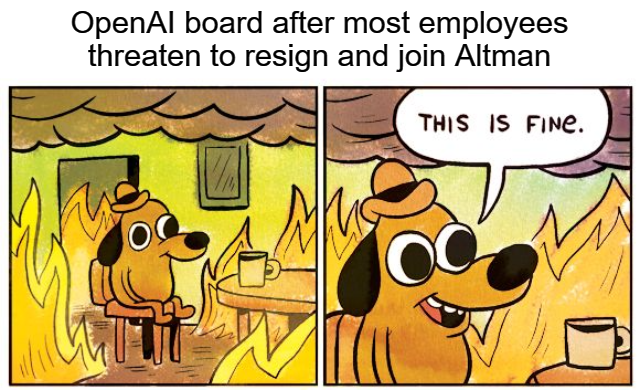Court Win: Delivered

Hi this is ZipLaw! We explain how news stories impact law firms so you can stand out in your applications.
Are you new here? Get free emails to your inbox.
Here’s what we’re serving today:
- 🥡 Deliveroo delivers in the Supreme Court
- 🤖 What's going on at OpenAI?
- 💸 Bond Market Tightrope
Deliveroo delivers in the Supreme Court
In short:
The UK Supreme Court has ruled that Deliveroo riders cannot be classified as employees, marking a significant decision for the gig economy.
What’s going on?
After a legal battle spanning over seven years, Deliveroo riders in the UK have hit a roadblock. The UK Supreme Court has decided that these riders aren't employees, but independent contractors. This ruling is pivotal because it upholds the idea that Deliveroo riders can't form or join trade unions for collective bargaining.
Why? Mainly because these riders can substitute someone else to do their deliveries, showcasing a level of independence not typical of traditional employment.

Here's a twist: riders are free to reject work, remain unavailable, or even work for competitors. Deliveroo champions this verdict as a victory for flexibility. They argue that many are eager to work under such flexible conditions, sweetened with perks like free insurance and parental support. However, the Independent Workers’ Union of Great Britain (IWGB) and its rider members are less than thrilled, seeing this as a denial of basic worker protections.
Why does it matter?
In focus: A double-edged sword?
This ruling highlights a core debate in the gig economy: flexibility versus security. Deliveroo's model, now legally endorsed, offers workers freedom to choose when and where they work. But at what cost? This model bypasses traditional employment protections like sick pay or guaranteed minimum wage, raising concerns about the precarity of gig work. The decision might embolden other gig companies to adopt similar models, reshaping the landscape of casual work.
The bigger picture: A regulatory crossroads.
The verdict isn’t just about Deliveroo; it’s a signal to the entire gig economy in the UK and potentially beyond. While the UK takes a step towards reinforcing the gig model, the EU is moving in the opposite direction, with proposals to offer more protections to gig workers. This divergence raises questions about the future of gig work and its regulation. Will companies like Deliveroo adapt or withdraw from stricter regulatory environments, as seen in Spain? (Note: Deliveroo ceased operations in Spain almost a year ago after the country amended laws to give gig economy workers rights including collective bargaining). This decision could be a landmark in defining the balance between worker flexibility and security in the evolving gig economy.
⚖️ How does this impact Law Firms?
Employment Law:
- Contractual Advisory Services: Most clients will want to discuss the result of this case, and understand how it impacts them. Lawyers will be increasingly consulted to draft and review contractual agreements between gig economy companies and their workers. This includes clear definitions of employment status, rights, and obligations to align with the latest legal precedents. These agreements must be carefully drafted to delineate the fine line between an employee and a contractor, in light of the Deliveroo case.
- Dispute Resolution: With the Deliveroo ruling setting a precedent, employment lawyers will likely handle more disputes and potential litigation involving gig economy workers. They will represent either the companies or the workers in cases questioning employment status, rights to collective bargaining, and other employment rights. Each case will require a nuanced understanding of the evolving legal landscape in this sector.
Corporate and Commercial Law:
- Business Model Consultation: As companies in the gig economy might seek to modify their business models to align with legal standards, corporate lawyers will be in demand to advise on these strategic shifts. They will assess the legal implications of different operational models and provide guidance on structuring relationships with workers to mitigate legal risks.
- Regulatory Compliance: Given the potential for new regulations in response to the ruling, corporate and commercial lawyers will be tasked with ensuring that gig economy businesses comply with existing and emerging laws. They will monitor legislative developments, advise on policy adjustments, and help implement compliant business practices.
Public Policy and Regulatory Affairs:
- Legislative Advocacy: Lawyers specialising in public policy will work with gig economy companies, trade unions, and worker groups to advocate for or against legislative changes. Their work will involve drafting position papers, advising on policy proposals, and liaising with lawmakers to influence future regulations in the gig economy.
- Regulatory Strategy Development: They will assist companies in navigating the changing regulatory landscape. They will develop strategies to adapt to new regulations, including advising on the implications of potential EU-wide directives on gig economy workers and how these might affect UK businesses.
What's going on at OpenAI?

In short:
Sam Altman, co-founder of OpenAI, was ousted as CEO, causing ripples across the tech world. Microsoft swooped in, hiring Altman to lead its in-house AI team.
What’s going on?
- Sam Altman, once at the helm of OpenAI, found himself suddenly without a CEO chair. Why? The board cited a lack of candor in his communications.
- This twist took many by surprise, including OpenAI president Greg Brockman, who resigned in protest.
- More than 730 employees of OpenAI have signed a letter saying they may quit and join Sam Altman at Microsoft unless the startup’s board resigns and reappoints the ousted CEO.
- Meanwhile, Microsoft, already a major backer of OpenAI, didn't waste time; it announced Altman and Brockman would lead its new AI division.
- Twitch CEO Emmett Shear steps in as Altman’s successor at OpenAI, signaling a potential shift in the company's AI strategy.

What caused the drama?
At the heart of OpenAI's recent drama lies a classic dilemma: should AI be a fast-track to profit or handled with extreme caution? While Sam Altman pushed for pumping up the business to keep up with ChatGPT's sky-high demands, some board members, with their feet firmly in the 'AI-skeptical' camp, weren't buying it. They worry about nightmare scenarios where AI falls into the wrong hands – think bioweapons and terror plots. This clash is more than just boardroom tension; it's a snapshot of the bigger ethical puzzle in the AI world.
We are monitoring this story closely and will provide our views on its impacts on law firms as soon as the dust settles a bit more.
Bond Market Tightrope
In short:
Sovereign bond sales (i.e. bonds issues by national governments) are expected to rise next year, while central banks cut down their bond holdings, potentially leading to higher bond yields and market instability.
What’s going on?
Get ready for a bumpy ride in the bond market! Next year, the bond sales by countries are expected to skyrocket because they need more money to cover their expenses. At the same time, the big players like the Federal Reserve and the European Central Bank are putting fewer bonds in their shopping carts. This is like having more products in the market but fewer buyers, which usually means prices drop, or in bond terms, yields go up.

Now, bond yields have already been climbing, and they're not just taking a gentle hike up a hill – we're talking more like scaling a mountain. U.S. Treasury bond issuance is expected to hit a record $1.34 trillion next year, but that's still not enough to cover their predicted budget deficit. This could mean even more bonds flooding the market.

Why does it matter?
In focus: A Tightrope Walk
This situation is a bit like trying to balance on a tightrope. On one side, countries are issuing more bonds because they need cash. On the other, central banks are trying to shrink their bond stockpiles. This balance is tricky because too much bond supply without enough demand could lead to a sharp increase in borrowing costs. That's not good news for governments or investors.
Wide lens: Global Ripples
This is not just a U.S. story – Europe's in a similar boat. They're upping their bond sales big time, and the European Central Bank is also slowing down on buying bonds. This double-whammy could send ripples across the global market. When bond supply exceeds demand, bond prices fall and yields (interest rates) rise. Higher bond yields can lead to higher borrowing costs for both governments and businesses. This can increase the cost of financing public debt and corporate expansions, potentially slowing down economic activity which has already been flattening in the past few years.
⚖️ How does this impact Law Firms?
Financial Regulation:
- Debt Issuance Compliance: Lawyers in this department will be heavily involved in ensuring compliance with regulations surrounding the issuance of new sovereign bonds. This involves drafting and reviewing prospectuses, ensuring disclosure requirements are met, and advising on the legal implications of bond structures and terms. They will also be responsible for navigating the complex regulatory landscape across different jurisdictions, especially for bonds issued in multiple markets.
- Central Bank Policy Advisory: As central banks like the Bank of England adjust their policies in response to market changes, financial regulation lawyers will be tasked with interpreting these changes for clients. This involves advising on the implications of central bank decisions for market participants, such as changes in quantitative easing programs, and providing strategic advice on adapting to these regulatory shifts.
Note: Quantitative easing is when central banks buy financial assets, like government bonds, to inject money into the economy and encourage lending and investment. It's like adding fuel to the economy's engine to help it run faster.
Corporate Finance:
- Debt Restructuring Advice: Lawyers specialising in corporate finance will likely see an uptick in advising companies on restructuring their debt in light of changing bond yields and market conditions. This work includes negotiating terms with creditors, restructuring existing debt agreements, and providing strategic advice on managing financial risks.
- Capital Raising Strategies: They will also be instrumental in advising companies on capital raising strategies amidst fluctuating bond markets. This involves evaluating and structuring equity and debt offerings, including bonds, and advising on the legal implications and risks associated with different capital raising approaches.
Litigation and Dispute Resolution:
- Breach of Contract Claims: With the volatility in the bond market, there’s an increased likelihood of disputes over contractual obligations. Lawyers in this department will represent clients in cases where there are allegations of breach of contract related to bond agreements, including disputes over terms, payment defaults, or covenant breaches.
- Investor Litigation: Lawyers will also likely be involved in representing investors or issuers in litigation arising from investment losses or misrepresentation in bond issuances. This involves handling claims related to the adequacy of disclosures in bond prospectuses, misrepresentations, or omissions which might have led to investment losses.
👀 ZIPMEMES

Don't forget...
🙏 Our work is reader-supported. You can get a membership for cheap!
🎥 Follow us on Instagram here or TikTok here.
📫 Forward this to a friend and tell them to subscribe (hint: it's here).
